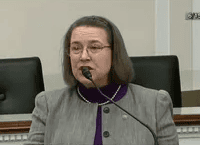Private investment in space exploration is nothing new, according to historian Alexander C. MacDonald. In fact, he argued in the National History Center’s most recent Congressional Briefing, the mid-20th-century Cold War model in which space exploration was financed chiefly by national governments is actually the anomaly.
MacDonald is program executive in the Emerging Commercial Space Office at NASA’s Ames Research Center and a doctoral candidate in economic history at Oxford University. He told an audience of 70 gathered in the “Space Room” of the Rayburn House Office Building on June 15 that the history of space exploration is one of very substantial private financial involvement. He urged his audience to view current efforts in the context of a “long space age,” beginning in 1831 with the construction of astronomical observatories financed through private philanthropy or subscriptions from the public.
He cited the role that private funding played in the rocketry experiments of pioneering space scientist Robert Goddard in the 1920s and 1930s, the creation of the first “space company” in the 1940s, and the fascination with space exhibited by 19th-century writers such as Edgar Allan Poe and Edward Everett Hale. Novelist Hale, he noted, imagined what would now be recognized as a primitive global positioning system.
“The trend of wealthy Americans like Elon Musk, Jeff Bezos, and Robert Bigelow devoting their personal resources to the exploration of space is not a new phenomenon, but a long-term and enduring trend which is now reasserting itself in the post-Cold War environment,” he said.
MacDonald spoke as part of a three-historian panel assembled by moderator Roger D. Launius, senior curator in the Division of Space History at the Smithsonian National Air and Space Museum. Joining him were Matthew H. Hersch, lecturer in Science, Technology and Society at the University of Pennsylvania, and Joseph N. Tatarewicz, associate professor of history and director of the Human Context of Science and Technology program at the University of Maryland, Baltimore County. They addressed a group including congressional staff, National History Day students, interns from congressional offices and the Air and Space Museum, the historians of the U.S. Senate and House of Representatives, U.S. and journalists, and others with an interest in how the history of space exploration has shaped its future.
Hersch focused on human participation in space exploration. His forthcoming book,Inventing the American Astronaut, looks at the space program from the vantage point of labor history. He said humans venturing into space have figured into the mythologies of almost all world cultures, “with the act of flight to the heavens often associated with the acquisition of knowledge and power to influence affairs on Earth.” He emphasized the role of the military in the U.S. space program and the risks that have faced individuals preparing for space travel. NASA lost about 25 percent of its astronauts, mainly through training accidents, he said.
Even though advances in technology have made unpiloted spacecraft a more efficient means of obtaining information about the universe, there remains a deep-seated desire among humans to travel into space, according to Hersch. He concluded that it would be unwise to presume that the future of humans in space is limited, observing that “over one hundred years separated Christopher Columbus’s first voyage to the Americas and the establishment of the first permanent European colonies in the ‘New World.'”
The recent retirement of the space shuttles has left the United States in a position similar to that following the end of the Apollo program, according to Tatarewicz, a former curator at the Air and Space Museum and a scholar of the scientific advances that grew out of the race to the moon. “We are in the midst of one of the most fractious and contested periods of space history and policy ever,” he said, but added that space policy has always been a contentious arena. Even in the era of frenzied activity that followed the Russian launch of Sputnik I, the first artificial satellite, in 1957, scientists resisted the opportunity to make use of space as an environment for scientific experimentation. But it is their successors who guarantee that space exploration will continue, whether primarily funded by private entrepreneurs or by government bureaucracies.
“Past and current programs of all spacefaring nations have transformed nearly every scientific field and created new disciplines,” Tatarewicz said. “Contemporary science is infused with space, and its various research agendas presume access for their current health and future progress.”
The briefing was videorecorded by AHA staff and by C-Span. For links to both recordings, please see the National History Center web site.

